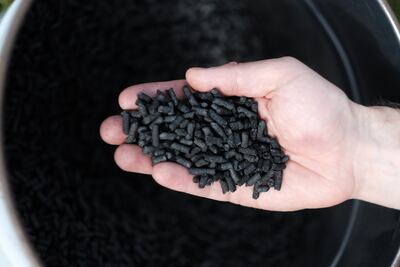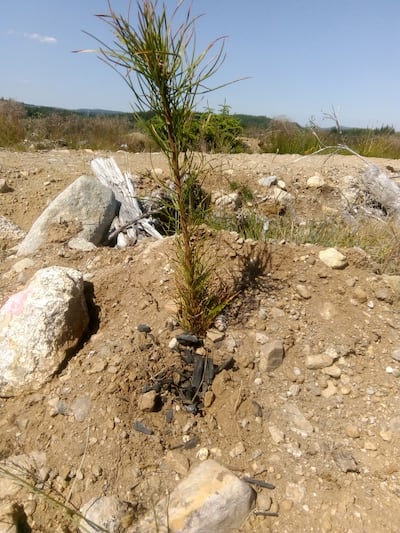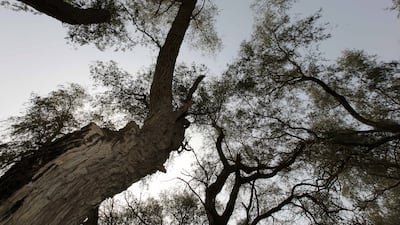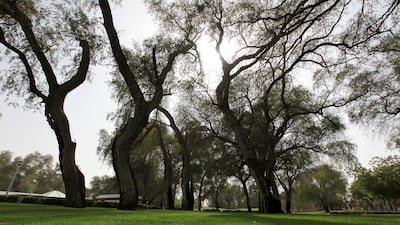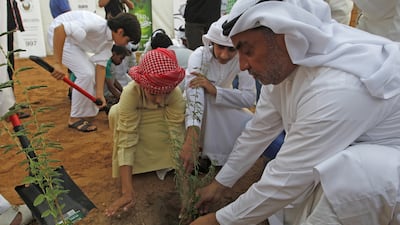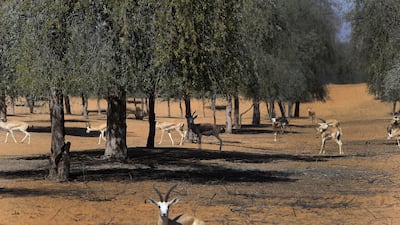From carp outcompeting native species, through to zebra mussels multiplying in vast numbers, and knotweed damaging buildings, invasive species have been blamed for ecological and other harms across the planet.
The UAE has also fallen victim, notably with Prosopis juliflora, a Central American mesquite tree introduced to the country around five decades ago as part of afforestation efforts.
It is now found in large numbers across several emirates, particularly in the north-east of the country where it crowds out native plant species.
However, rather than attempt the difficult task of simply eliminating this invasive species, a UAE-based researcher has said that the juliflora could be harvested and then converted into biochar — a charcoal-like substance that is created by burning wood or other biomass at a high temperature without oxygen.
The proposal from Dr Ali El Keblawy, of the University of Sharjah, could bring several benefits. Biochar can improve the nutrient and water-retaining qualities of the soil, help reduce water use by the trees and store carbon in the soil.
“Biochar is organic material that can be [added] to nutrient-poor soil to enrich the soil fertility and enhance the physical, chemical properties. It can make the soil suitable for agriculture,” Dr El Keblawy said.
Biochar can be spread on soil and, unlike wood, is not broken down by microorganisms, remaining stable for tens or even hundreds of years instead of releasing its carbon quickly.
Previous research has suggested that the closely-related ghaf tree, Prosopis cineraria, which in 2008 was named the UAE’s national tree, is suitable for biochar.
Dr El Keblawy would like to secure funding to develop project to use the juliflora tree plant for biochar production.
Juliflora spreads easily because its seeds are eaten by animals and germinate after being released in faeces.
“It is really hard to be controlled. No animal can eat it, just the fruits. This means it is a non-grazeable plant,” said Dr El Keblawy.
“All the trials, not [just] here but globally, have failed to get rid of this species.”
Outcompeting other species
The tree uses a taproot several metres deep to extract large amounts of water — a very limited resource in the UAE. It also has a dense, shallow fibrous layer of roots nearer the surface that absorb nutrients and water from other plants.
Dr El Keblawy has supervised a PhD student who has uncovered further details about how the large roots help the tree to outcompete other species.
Dr Francois Mitterand Tsombou found that the roots of the juliflora extend several metres horizontally, compared to just 40cm or so for the roots of the ghaf tree.
“If there is anything growing from [above the root], the plant … will not have any chance to have humidity, to have nutrients,” Dr Tsombou said.
“The root of the exotic will capture all the water availability, all the nutrients and any native plant will not survive under the canopy of this one.”
Aside from its heavy consumption of water and nutrients, the juliflora tree suppresses the growth of native plants by releasing chemicals — a phenomenon known as allelopathy.
As part of his research, Dr Tsombou collected leaves of juliflora, another non-native tree, Prosopis pallida and the ghaf tree.
Laboratory tests showed that substances in the leaves of the juliflora had a “strongly negative” effect on the growth of other plants, an effect not seen with the leaves of the other two species.
In the juliflora's native territory, these chemicals are used to defend against animals that might eat the plant, but in the UAE they have the effect of suppressing other plant growth.
“The leaves of the Prosopis juliflora contain a lot of inhibitory chemicals that neutralise the growth native plant species,” Dr Tsombou said.
Aside from harming native species, the plant produces large quantities of pollen grains for much of the year, which can cause allergies for sensitive people.
The UAE is not the only country where the juliflora has caused issues. In Kenya, it was credited with creating a green, tree-covered landscape less prone to generating sandstorms.
However, as in the UAE, in Kenya, the plant’s seeds spread in the dung of animals and the tree has become difficult to control, causing the loss of grazing and croplands, the blocking of rivers and even the displacement of people from their homes.
Company%C2%A0profile
%3Cp%3ECompany%3A%20Zywa%3Cbr%3EStarted%3A%202021%3Cbr%3EFounders%3A%20Nuha%20Hashem%20and%20Alok%20Kumar%3Cbr%3EBased%3A%20UAE%3Cbr%3EIndustry%3A%20FinTech%3Cbr%3EFunding%20size%3A%20%243m%3Cbr%3ECompany%20valuation%3A%20%2430m%3C%2Fp%3E%0A
Living in...
This article is part of a guide on where to live in the UAE. Our reporters will profile some of the country’s most desirable districts, provide an estimate of rental prices and introduce you to some of the residents who call each area home.
UPI facts
More than 2.2 million Indian tourists arrived in UAE in 2023
More than 3.5 million Indians reside in UAE
Indian tourists can make purchases in UAE using rupee accounts in India through QR-code-based UPI real-time payment systems
Indian residents in UAE can use their non-resident NRO and NRE accounts held in Indian banks linked to a UAE mobile number for UPI transactions
Global state-owned investor ranking by size
|
1.
|
United States
|
|
2.
|
China
|
|
3.
|
UAE
|
|
4.
|
Japan
|
|
5
|
Norway
|
|
6.
|
Canada
|
|
7.
|
Singapore
|
|
8.
|
Australia
|
|
9.
|
Saudi Arabia
|
|
10.
|
South Korea
|
WHAT%20MACRO%20FACTORS%20ARE%20IMPACTING%20META%20TECH%20MARKETS%3F
%3Cp%3E%E2%80%A2%20Looming%20global%20slowdown%20and%20recession%20in%20key%20economies%3C%2Fp%3E%0A%3Cp%3E%E2%80%A2%20Russia-Ukraine%20war%3C%2Fp%3E%0A%3Cp%3E%E2%80%A2%20Interest%20rate%20hikes%20and%20the%20rising%20cost%20of%20debt%20servicing%3C%2Fp%3E%0A%3Cp%3E%E2%80%A2%20Oil%20price%20volatility%3C%2Fp%3E%0A%3Cp%3E%E2%80%A2%20Persisting%20inflationary%20pressures%3C%2Fp%3E%0A%3Cp%3E%E2%80%A2%20Exchange%20rate%20fluctuations%3C%2Fp%3E%0A%3Cp%3E%E2%80%A2%20Shortage%20of%20labour%2Fskills%3C%2Fp%3E%0A%3Cp%3E%E2%80%A2%20A%20resurgence%20of%20Covid%3F%3C%2Fp%3E%0A
BMW M5 specs
Engine: 4.4-litre twin-turbo V-8 petrol enging with additional electric motor
Power: 727hp
Torque: 1,000Nm
Transmission: 8-speed auto
Fuel consumption: 10.6L/100km
On sale: Now
Price: From Dh650,000
Water waste
In the UAE’s arid climate, small shrubs, bushes and flower beds usually require about six litres of water per square metre, daily. That increases to 12 litres per square metre a day for small trees, and 300 litres for palm trees.
Horticulturists suggest the best time for watering is before 8am or after 6pm, when water won't be dried up by the sun.
A global report published by the Water Resources Institute in August, ranked the UAE 10th out of 164 nations where water supplies are most stretched.
The Emirates is the world’s third largest per capita water consumer after the US and Canada.
Tamkeen's offering
- Option 1: 70% in year 1, 50% in year 2, 30% in year 3
- Option 2: 50% across three years
- Option 3: 30% across five years
Company profile
Name: Steppi
Founders: Joe Franklin and Milos Savic
Launched: February 2020
Size: 10,000 users by the end of July and a goal of 200,000 users by the end of the year
Employees: Five
Based: Jumeirah Lakes Towers, Dubai
Financing stage: Two seed rounds – the first sourced from angel investors and the founders' personal savings
Second round raised Dh720,000 from silent investors in June this year
If you go...
Fly from Dubai or Abu Dhabi to Chiang Mai in Thailand, via Bangkok, before taking a five-hour bus ride across the Laos border to Huay Xai. The land border crossing at Huay Xai is a well-trodden route, meaning entry is swift, though travellers should be aware of visa requirements for both countries.
Flights from Dubai start at Dh4,000 return with Emirates, while Etihad flights from Abu Dhabi start at Dh2,000. Local buses can be booked in Chiang Mai from around Dh50
The specs
Engine: 1.6-litre 4-cyl turbo
Power: 217hp at 5,750rpm
Torque: 300Nm at 1,900rpm
Transmission: eight-speed auto
Price: from Dh130,000
On sale: now
About RuPay
A homegrown card payment scheme launched by the National Payments Corporation of India and backed by the Reserve Bank of India, the country’s central bank
RuPay process payments between banks and merchants for purchases made with credit or debit cards
It has grown rapidly in India and competes with global payment network firms like MasterCard and Visa.
In India, it can be used at ATMs, for online payments and variations of the card can be used to pay for bus, metro charges, road toll payments
The name blends two words rupee and payment
Some advantages of the network include lower processing fees and transaction costs
COMPANY%20PROFILE
%3Cp%3E%3Cstrong%3ECompany%20name%3A%20%3C%2Fstrong%3ESupy%0D%3Cbr%3E%3Cstrong%3EStarted%3A%20%3C%2Fstrong%3E2021%0D%3Cbr%3E%3Cstrong%3EFounders%3A%20%3C%2Fstrong%3EDani%20El-Zein%2C%20Yazeed%20bin%20Busayyis%2C%20Ibrahim%20Bou%20Ncoula%0D%3Cbr%3E%3Cstrong%3EBased%3A%20%3C%2Fstrong%3EDubai%0D%3Cbr%3E%3Cstrong%3EIndustry%3A%20%3C%2Fstrong%3EFood%20and%20beverage%2C%20tech%2C%20hospitality%20software%2C%20Saas%0D%3Cbr%3E%3Cstrong%3EFunding%20size%3A%20%3C%2Fstrong%3EBootstrapped%20for%20six%20months%3B%20pre-seed%20round%20of%20%241.5%20million%3B%20seed%20round%20of%20%248%20million%0D%3Cbr%3E%3Cstrong%3EInvestors%3A%20%3C%2Fstrong%3EBeco%20Capital%2C%20Cotu%20Ventures%2C%20Valia%20Ventures%20and%20Global%20Ventures%3C%2Fp%3E%0A
More on animal trafficking
Results
4.30pm Jebel Jais – Maiden (PA) Dh60,000 (Turf) 1,000m; Winner: MM Al Balqaa, Bernardo Pinheiro (jockey), Qaiss Aboud (trainer)
5pm: Jabel Faya – Maiden (PA) Dh60,000 (T) 1,000m; Winner: AF Rasam, Tadhg O’Shea, Ernst Oertel
5.30pm: Al Wathba Stallions Cup – Handicap (PA) Dh70,000 (T) 2,200m; Winner: AF Mukhrej, Tadhg O’Shea, Ernst Oertel
6pm: The President’s Cup Prep – Conditions (PA) Dh100,000 (T) 2,200m; Winner: Mujeeb, Richard Mullen, Salem Al Ketbi
6.30pm: Abu Dhabi Equestrian Club – Prestige (PA) Dh125,000 (T) 1,600m; Winner: Jawal Al Reef, Antonio Fresu, Abubakar Daud
7pm: Al Ruwais – Group 3 (PA) Dh300,000 (T) 1,200m; Winner: Ashton Tourettes, Pat Dobbs, Ibrahim Aseel
7.30pm: Jebel Hafeet – Maiden (TB) Dh80,000 (T) 1,400m; Winner: Nibraas, Richard Mullen, Nicholas Bachalard
Bullet%20Train
%3Cp%3E%3Cstrong%3EDirector%3A%3C%2Fstrong%3E%20David%20Leitch%3Cbr%3E%3Cstrong%3EStars%3A%3C%2Fstrong%3E%20Brad%20Pitt%2C%20Aaron%20Taylor-Johnson%2C%20Brian%20Tyree%20Henry%2C%20Sandra%20Bullock%3Cbr%3E%3Cstrong%3ERating%3A%3C%2Fstrong%3E%203%2F5%3C%2Fp%3E%0A
'The worst thing you can eat'
Trans fat is typically found in fried and baked goods, but you may be consuming more than you think.
Powdered coffee creamer, microwave popcorn and virtually anything processed with a crust is likely to contain it, as this guide from Mayo Clinic outlines:
Baked goods - Most cakes, cookies, pie crusts and crackers contain shortening, which is usually made from partially hydrogenated vegetable oil. Ready-made frosting is another source of trans fat.
Snacks - Potato, corn and tortilla chips often contain trans fat. And while popcorn can be a healthy snack, many types of packaged or microwave popcorn use trans fat to help cook or flavour the popcorn.
Fried food - Foods that require deep frying — french fries, doughnuts and fried chicken — can contain trans fat from the oil used in the cooking process.
Refrigerator dough - Products such as canned biscuits and cinnamon rolls often contain trans fat, as do frozen pizza crusts.
Creamer and margarine - Nondairy coffee creamer and stick margarines also may contain partially hydrogenated vegetable oils.
CHATGPT%20ENTERPRISE%20FEATURES
%3Cp%3E%E2%80%A2%20Enterprise-grade%20security%20and%20privacy%3C%2Fp%3E%0A%3Cp%3E%E2%80%A2%20Unlimited%20higher-speed%20GPT-4%20access%20with%20no%20caps%3C%2Fp%3E%0A%3Cp%3E%E2%80%A2%20Longer%20context%20windows%20for%20processing%20longer%20inputs%3C%2Fp%3E%0A%3Cp%3E%E2%80%A2%20Advanced%20data%20analysis%20capabilities%3C%2Fp%3E%0A%3Cp%3E%E2%80%A2%20Customisation%20options%3C%2Fp%3E%0A%3Cp%3E%E2%80%A2%20Shareable%20chat%20templates%20that%20companies%20can%20use%20to%20collaborate%20and%20build%20common%20workflows%3C%2Fp%3E%0A%3Cp%3E%E2%80%A2%20Analytics%20dashboard%20for%20usage%20insights%3C%2Fp%3E%0A%3Cp%3E%E2%80%A2%20Free%20credits%20to%20use%20OpenAI%20APIs%20to%20extend%20OpenAI%20into%20a%20fully-custom%20solution%20for%20enterprises%3C%2Fp%3E%0A
EA Sports FC 26
Publisher: EA Sports
Consoles: PC, PlayStation 4/5, Xbox Series X/S
Rating: 3/5
'Hocus%20Pocus%202'
%3Cp%3EDirector%3A%20Anne%20Fletcher%3Cbr%3E%3Cbr%3EStars%3A%20Bette%20Midler%2C%20Sarah%20Jessica%20Parker%2C%20Kathy%20Najimy%3Cbr%3E%3Cbr%3ERating%3A%203.5%2F5%3C%2Fp%3E%0A
How to apply for a drone permit
- Individuals must register on UAE Drone app or website using their UAE Pass
- Add all their personal details, including name, nationality, passport number, Emiratis ID, email and phone number
- Upload the training certificate from a centre accredited by the GCAA
- Submit their request
What are the regulations?
- Fly it within visual line of sight
- Never over populated areas
- Ensure maximum flying height of 400 feet (122 metres) above ground level is not crossed
- Users must avoid flying over restricted areas listed on the UAE Drone app
- Only fly the drone during the day, and never at night
- Should have a live feed of the drone flight
- Drones must weigh 5 kg or less
